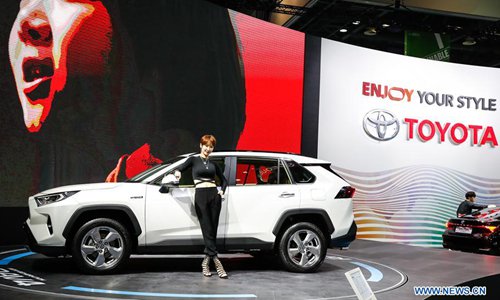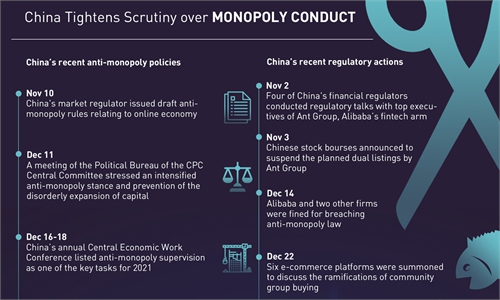
Photo taken on April 2, 2019 shows a Toyota RAV4 during the 2019 edition of Seoul Motor Show in Goyang, South Korea. (Photo: Xinhua)
China set up 103 anti-monopoly probes in 2019, the top market regulator said in a report on Friday. 46 cases were concluded and 320 million yuan ($49 million) worth of fines were imposed.
Half of all typical cases involved foreign companies, according to the official website of the State Administration for Market Regulation (SAMR), including in September when the regulator fined Ford Motor Co.'s main local joint venture 162.8 million yuan for breaching the law by setting a minimum resale price for its cars in Southwest China's Chongqing municipality since 2013.
Another case involved Japanese carmaker Toyota Motor, who was fined 87.6 million yuan in December for price-fixing its premium Lexus cars in East China's Jiangsu Province.
US-based Eastman Chemical was fined 24 million yuan in April for abusing its dominance in the market.
Ten concrete companies in Yan'an, Northwest China's Shaanxi Province, were fined 4.92 million yuan for breaking the law in Aug. A state-owned water supplier in North China's Tianjin Municipality was fined 7.43 million yuan for making developers use a designated company to construct secondary water supply facilities.
Ten concrete companies in Yan'an, Shaanxi Province, were fined 4.92 million yuan for breaking the law in Aug. A state-owned water supplier in Tianjin was fined 7.43 million yuan for making developers to use a designated company to construct secondary water supply facilities.
"Anti-monopoly enforcement has become a normal situation," the regulator said.
In 2019, 43 cases of abusing market dominance were filed, and 16 cases were closed with fines of 310 million yuan, as the number of cases filed increased by 19.4 percent compared with 2018, and the amount of fines rose 11.9 percent year-on-year, the report showed.
China is seeking to bolster laws and regulations to combat monopolies in the country with a sweeping overhaul that raises punishments for offenders and covers new business models, as part of a broad push to improve the market climate for both domestic and foreign businesses amid persistent downward pressure on growth.
China's top legislature is expected to deliberate revisions to the anti-monopoly law in 2021, said Yue Zhongming, spokesperson for the Legislative Affairs Commission of the National People's Congress (NPC) Standing Committee on Monday.

